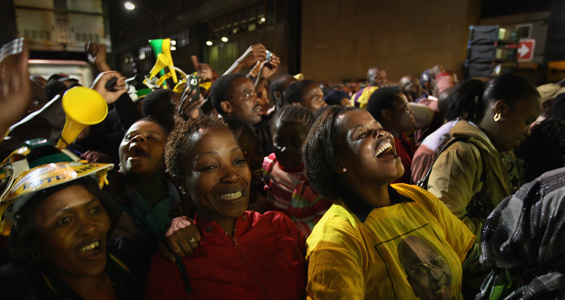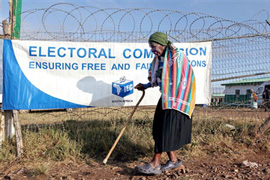A victory for all in S Africa polls
Despite the ANC’s expected win, most parties can find some consolation in the results.

 |
| Supporters cheer as Jacob Zuma speaks during an ANC victory celebration [GALLO/GETTY] |
Throughout the day representatives of all the parties were at the headquarters of the Independent Electoral Commission in Pretoria: all eyes continually swivelling towards the giant results screen that dominated the room. This was the nerve centre of the South African elections.
The ballot papers marked in pencil by voters around the country were physically counted at centres in all of the nine provinces. Once counted and audited, the results were fed over the internet to the Pretoria headquarters.
| South African election 2009 |
|
|
There, observers looked for any anomalies in the count, any indication that there had been tampering.
Then the auditors again went through each result before it was typed into the system, typed twice to avoid any mistakes, the end product finally appearing up on the results screen.
What had started as a pencil mark on paper was now part of a national picture.
It was a picture that was clear from early in the day. The African National Congress was on its way to yet another sweeping victory, and the Democratic Alliance was going to hold on to its position as the official opposition in parliament.
New player
The third major party, the Congress of the People or Cope, was contesting an election for the first time. A group of politicians that had broken away from the ANC had only formed it a few months ago.
It received less than 10 per cent of the vote, about half of that won by the DA – the party Cope was attempting to unseat as the official opposition.
| In video | ||
|
| ||
 Economic woes imperil South Africa’s Aids fight Economic woes imperil South Africa’s Aids fight Inequality persists in South African schools Inequality persists in South African schools Kimberley miners hit by economic slowdown Kimberley miners hit by economic slowdown South Africans face lack of basic services South Africans face lack of basic services  Security a key issue in South African elections Security a key issue in South African elections |
On the face of it, it was a disappointing result, and yet Cope leaders argue it is a real achievement to become South Africa’s third most popular party after existing for little more than 130 days.
A common campaign platform of all the opposition parties was that every effort must be made to prevent the ANC from achieving a two-thirds majority in parliament.
The reason for this essentially a constitutional one: ordinary legislation is passed by a simple majority, that is more than 50 per cent of parliamentarians have to agree.
However, any amendment to the country’s constitution requires a two-thirds majority, 66.6 per cent of the parliamentary vote.
This supposedly acts as a safeguard against any government of the day choosing to change the constitution that was drawn up by all parties in the early days of South African democracy.
It was intended too as a guarantee that no one party could rule while ignoring the checks and balances written into the constitution.
Primary aim
The ANC, though, has been eager to dispel the notion that achieving this two-thirds majority was its primary aim.
In addition, party leaders have pointed out that the organisation has held well over a two-thirds majority for the past decade. At no stage has there been any indication that it was contemplating any moves to amend the constitution.
Its primary intention in this election, party officials say, was to attract more voters than it has before. In this it has certainly succeeded, but this may be in part explained by the fact that there were more voters taking part in this election than ever before.
 |
| A woman leaves a polling station after casting her vote in the rural village of Nkandla [AFP] |
More than 23 million people were registered as voters, and over 21 million actually cast their votes.
This is a figure that is even higher than achieved in the first democratic elections in 1994.
The final percentage poll this time will definitely not be the massive 89 per cent that was achieved then.
Ultimately, though, most parties can find some form of victory in this election, one that was largely contested in the most celebratory of ways.
The bitter political infighting of recent years has apparently been forgotten for a while. The disillusionment with the political system had suddenly dissipated as the people flooded to the polls.
The greatest success perhaps is that the proceedings were peaceful.
The absence of violence, an achievement in which all, regardless of political affiliation, takes the greatest pride.
